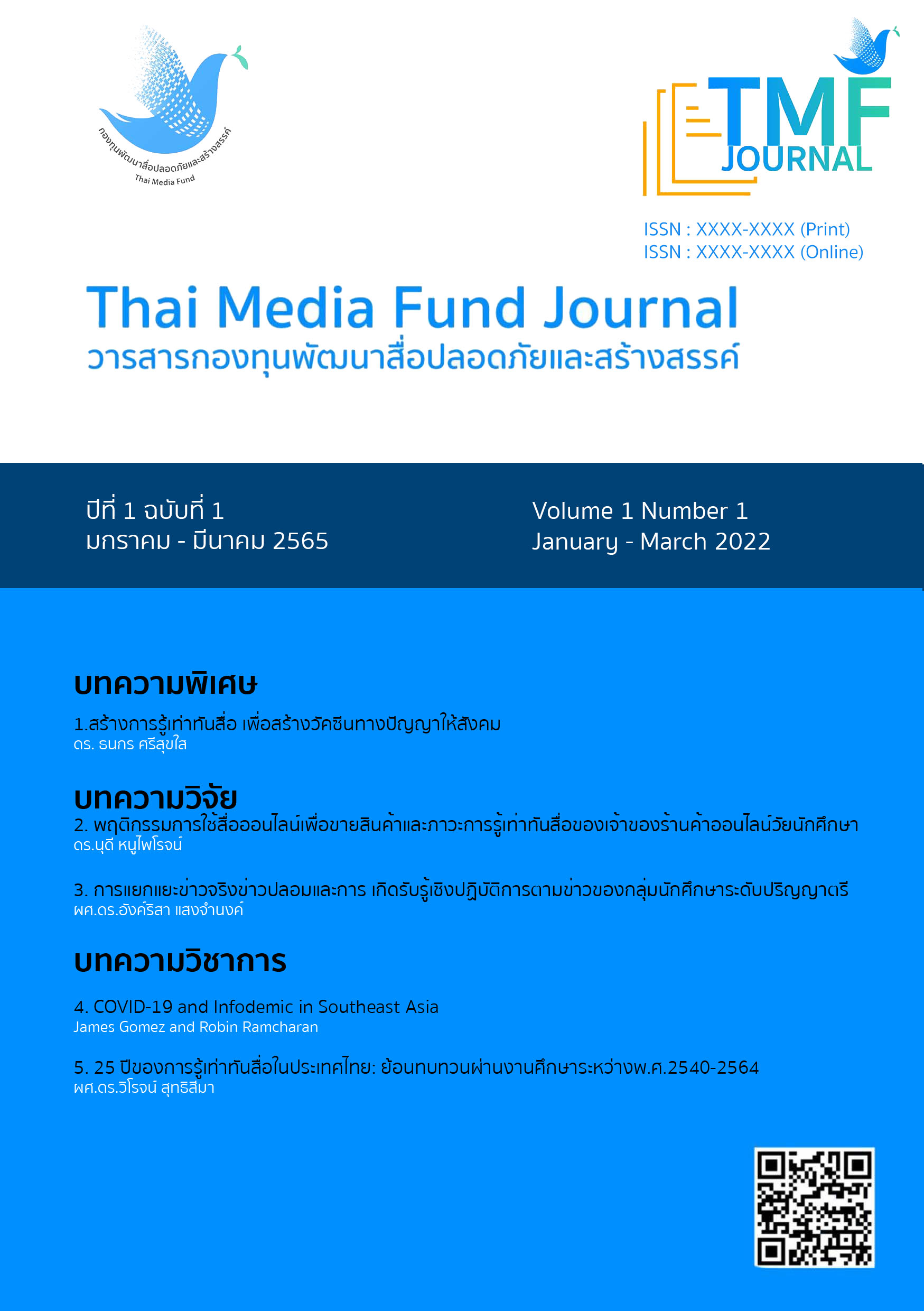25 ปีของการรู้เท่าทันสื่อในประเทศไทย: ย้อนทบทวนผ่านงานศึกษาระหว่าง พ.ศ.2540-2564
Main Article Content
บทคัดย่อ
บทความนี้มีวัตถุประสงค์ย้อนทบทวนลักษณะความรู้จากการศึกษาเกี่ยวกับการรู้เท่าทันสื่อในประเทศไทยเป็นเวลา 25 ปี ตั้งแต่ปี พ.ศ. 2540 ถึง 2564 พบว่า งานศึกษาตอบวัตถุประสงค์ทางด้านการรู้เท่าทันสื่อของ “ผู้ใช้” มากที่สุด ส่วนใหญ่เป็นงานวิจัยจากวิทยานิพนธ์ระดับปริญญาโทและงานวิจัยทั่วไปซึ่งได้รับงบประมาณอุดหนุนจากสถาบัน งานศึกษาเหล่านี้เป็นมุ่งเน้นไปยังกลุ่มของเด็กและเยาวชน ซึ่งในระยะหลังใช้บริบทของอินเทอร์เน็ตมากที่สุด โดยลักษณะงานศึกษามากที่สุด คือ เชิงสำรวจโดยมีการใช้แบบสอบถามเป็นเครื่องมือวิจัยหลัก
ลักษณะงานศึกษาและโครงการที่มีความโดดเด่นมากที่สุดในยุคหลัง ได้แก่ การศึกษาในบริบทดิจิทัล การกลั่นแกล้งออนไลน์ และข่าวปลอม (Fake News) แม้หัวข้อการศึกษาในรอบ 5 ปีหลังในบริบทของโรคระบาด COVID-19 จะยังไม่ได้บุกเบิกไปสู่หัวข้อใหม่นัก แต่การถูกนำไปสู่ภาคปฏิบัติการรู้เท่าทันสื่อเช่น การอบรมเชิงปฏิบัติการ การสัมมนาวิชาการ ก็นับว่าเป็นความก้าวหน้าของการรู้เท่าทันสื่อในไทย
Article Details

อนุญาตภายใต้เงื่อนไข Creative Commons Attribution-NonCommercial-NoDerivatives 4.0 International License.
เอกสารอ้างอิง
Decoding 3 Problems of Why Thai Children Aren’t Motivated by Keeping Up with the Media. (2010). Retrieved Feb 1, 2022 from http://www.tnnthailand.com/news/tnnexclusive/ 86532
DES shows the total number of 23 million Thai people who shared fake news, and it was found that the media were more interested in the problem of “fake news”. (2021). Retrieved Dec 31, 2021 from: https://shorturl.asia/BApmw
Fedorov, A., & Mikhaleva, G. (2020). Current trends in media and information literacy in research and scientific publications of the early 21st century. International Journal of Media and Information Literacy, 5(2), 153-164.
Office of National Digital Economy and Society Commission. (2021). Survey of state of Media and information literacy of Thailand in 2020.
Owens, L. (2021). A post-pandemic wish: teach every child media literacy skills. Retrieved from https://thehill.com/changing -america/opinion/551018-a-post-pandemic-wish-teach-every-child-media-literacy-skills
Phanmool, J., & Propunprom, P. (2021). Situation of media access, fake news recognition and the impacts of media use of the elderly in urban communities in a new normal. Journal of Legal Entity Management and Local Innovation, 7(8), 171-184.
Results from the Thai people’s keeping up with the media, information technology, and digital information in the years 2020 and 2021. (2021). Retrieved Feb 1, 2022 from https://shorturl.asia/Pdlg5
Sukonratanamedhi, N. & Moksat, N. (2019). Social Media Literacy of Youth for Democratic Citizen. Research and Development Department, King Prajadhipok’s institute.
Suttisima, V., Chainan, P., & Yuwakosol, S. (2020) The state of media literacy research in Thailand (1997-2017). Journal of Management Science, Chiang Rai Rajabhat University, 15(2), 209-238.
Thuengnak, A. & Pan-Ngam, K. (2021). Relationship between Demographic Factors and Social Media Literacy of Undergraduate Students Faculty of Education, Kasetsart University. Electronic Journal of Open and Distance Innovative Learning, 2(2), 60-68.
Zdravkova, E., Yordanova, S., Planska-Simeonova, K. (2020). New Educational trends for media literacy and the prevention of fake news. EDULEARN20 Proceedings, 691-696.


